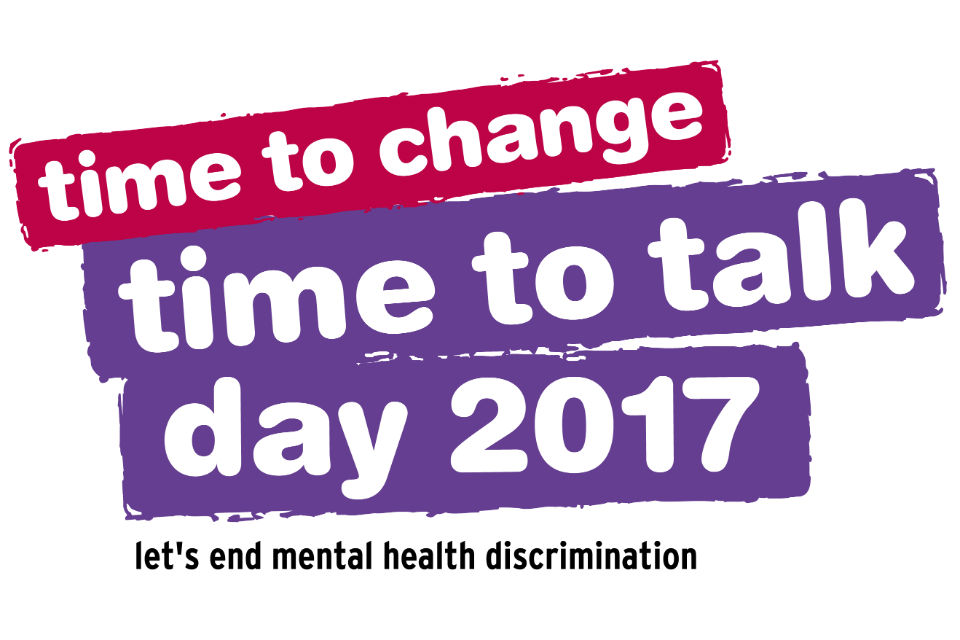
Today is Time to Talk Day, an opportunity for people to talk, text, blog or communicate about mental health.
The 'Time to Change' campaign aims to break the stigma attached to speaking about mental health. This national campaign will have people talking all over the country.

As Civil Service Health and Well-being Champion, I want to support what you are doing in your departments. So, today, I am really happy to be attending one of a number of Time to Talk events organised by the Time to Talk planning team at the Department for Communities and Local Government (DCLG). I will be talking to DCLG employees about the Civil Service commitment to health and well-being. Mental health is one of my priority areas and I’m keen to encourage people to talk about this issue.
I also hope to stop by their lunchtime Market Stall. This signposts to information and support on mental health illnesses and gives people the opportunity to talk to DCLG’s Mental Health Ambassadors. The ambassadors are trained Mental Health First Aiders who provide a listening, awareness raising and support service to employees.

There is support available wherever you are in the Civil Service.
If you want to talk to someone straight away, even in the middle of the night, then call your departmental Employee Assistance Programmes (EAPs) or equivalent. They can provide counselling and signposting to talking therapies such as Cognitive Behaviour Therapy.
You can use the Workplace Adjustment Passport for adjustments made for your mental health condition. The Passport can help you take your adjustments with you if you move jobs. You may have recently read Lisa’s blog that talks about how she used the passport.
If you’re off sick, then you and your manager can get support and advice through Occupational Health Services.
If you have a mental health condition and need support at work, then you can talk to your department’s Mental Health First Aider (or equivalent). They can signpost you to further help.
I find it so powerful and moving to hear people talking about their personal stories. What does it feel like for them? What helped them? Take a few minutes and log on to watch this video featuring civil servants talking about their mental health conditions and what helped them at work. This is hosted on the Civil Service Learning Portal, which also has a range of learning materials on topics such as mental health awareness and resilience.
I encourage you to take just a moment to talk today. In my own department – the Government Legal Department – we’re using today to talk about the launch of our own mental health First Aider scheme. Have a look at what’s going on where you are and, if you’d like to, share with me with you are doing in your department.

11 comments
Comment by John Chalmers posted on
Great to see this initiative. The equivalent organisation to 'time to change' in Scotland is 'see me'. In DFID with our only two UK offices being in London and East Kilbride, we signed pledges about supporting mental health awareness with both, and have links to both organisations materials on our intranet. It would be good to see all Departments making available on their intranet these (and any other relevant) website links to the mental health support organisations most relevant to where they have staff located in the UK.
Comment by Gavin Thomas posted on
Within the FCO, following the launch of the FCO Staff Association Wellbeing Network in June 2015, we have been ecouraged in the increase in both awareness and understanding in respect to Mental Health. We have also been encouraged by a number of our Overseas Posts and the work that they have been doing to support staff / dependants.
To increase awareness and understanding we recently invited a Guest Speaker to come in and give a talk about their lived in experience. The Guest Speaker certainly made the impact we had hoped for.
We hope that this will inspire others to take time out to review their mental health and general wellbeing and to also make time to have a regular conversation with a colleague, relative or friend.
I would also like to say that Time to Talk should not be for just 5 mins for one day every year but something that we all do on a regular basis.
Comment by Jonathan Jones posted on
Thank you Gavin for sharing information about the event held in the FCO.
Comment by unlucky posted on
Whilst I applaud this important event for bringing mental health issues to the forefront, I still think we have a long way to go in reducing the stigmas.
I feel that sharing mental health issues in the workplace, and the end of year review system, is somewhat mutually exclusive. It has been known for people to be marked down and penalised as being a poor performer at the end of year review, simply for being unfortunate to fall into that 1 in 4 statistic, even if they performed well and even to an high standard in previous years.
It happened to me a couple of years ago, which rather than encourage me to get back into working efficiently, completely knocked my confidence levels down to zero, and made me very despondent, unsupported, withdrawn, resentful, bitter, and mistrusting of everyone. If it wasn't for a new and supportive line manager who helped me back up on my feet with empathy and pragmatism, I think I would have spiralled down even further.
I think staff need to have that trust and feel reassured that if they are suffering from a mental health issue, that it's not going to go against them. If a staff member is acting out of character and their work begins to suffer, they need to be assured that they will get the necessary help and support at the earliest opportunity rather than being automatically labelled as being a poor performer.
Comment by Jonathan Jones posted on
Thank you for your comments. I agree that we still have some way to go to eradicate the stigma attached to mental health. Part of this is just talking about it which I think we are doing more of in the Civil Service. I am also championing mental health awareness training to help managers support team members with mental health issues.
Comment by Cliff posted on
"What support is available for civil servants?
Everyone in the Civil Service has access to an Employee Assistance Programme (EAP) that can provide information and support such as counselling. If you don’t know who the EAP provider is in your department, you can look on the intranet, speak to HR or ask your manager".
Type EAP into this site & see how far you get!.... I've looked on the Intranet, when not blocked, & went around in circles, ending up being told to "look on the Intranet". Not everyone want's to discuss it with their manager first!
Direct links would be very useful please.
Comment by Jonathan Jones posted on
Cliff, thank you for your comment. I agree this should be easy to find. I am going to take this issue away and speak to departments to see what we can do to make this information more easily accessible. If you have been unable to find your EAP supplier or list of mental health first aiders, please send an email to contact.us@csep.gov.uk and my team would be happy to look into this for you.
Comment by Ayoola Owojori posted on
We had an interactive and engaging session at Lloyds Chamber, Tower Hamlets Office. The turnout was impressive and the contributions were valuable and vital. Staff shared their experience of Mental Health which helped create better understanding amongst colleagues and raised the profile of Mental Health.
There was a general consensus amongst staff that there is less stigma now compared to couple of years ago, but acknowledging the fact that we still have some work ahead to create positive awareness of mental health issues and ensure that those affected benefit from equal opportunities in their respective organisations.
It was good to see managers attending the session and partaking in discussion sharing knowledge and experience, we all agreed that the best support we can render collectively is to be a good listener when called upon by a colleague and talk openly about mental health issues in the working place to remove the stigma and create better understanding.
Finally, 29 delegates participated in a quiz competition which was designed to test our knowledge of mental health issues and improve our understanding collectively. It was definitely an interesting, enlightening, engaging, interactive and an intellectual session. We must do more of these events in our various working places, like Tesco said, every little helps.
Comment by Jonathan Jones posted on
Thank you for sharing information about the open and honest mental health session held in your office. Also thank you for drawing attention to the importance of manual handling training which helps people understand how to avoid back injury when undertaking their daily duties.
Comment by Kirstie posted on
It would be helpful if you put links to find people such as the Employee Assistance Programmes (EAPs) or our Mental Health First Aider . I had no idea we actually had these people available and have no idea who they are. If links were included in the Blog it would be easy for people to access the information they require.
Comment by Jonathan Jones posted on
Thanks for your comment, Kirstie. Each department has their own set of Mental Health First Aiders (or equivalent) and departments use different Employee Assistance Providers. This is why I did not include links in the blog. You should be able to find this information on your intranet, through your line manager or HR contact centre. However, you’ve raised an important point. This information needs to be easily available for everyone. I will take this away and speak to departmental representatives to see how we can achieve this. In the meantime, if you are unable to find this information, please send an email to contact.us@csep.gov.uk and my team would be happy to look into this for you.